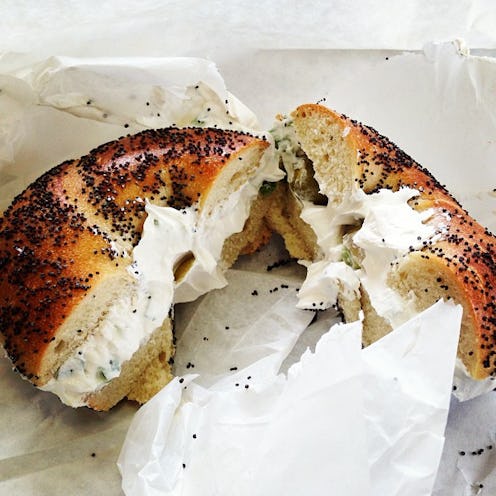
Look, other cities, Imma let you finish, but New York has the best bagels of all time. I'm not just blowing smoke here. First off, I live in the city now, so I basically consider it my new civic duty to brag to other people about our bagels. But it turns out there is actual science behind why New York has the best bagels, so anybody who tries to fight me on this issue is about to get dropped one stone cold knowledge bomb in the middle of the brunch they were trying to enjoy uninterrupted.
For a long time people have assumed that New York bagels get their distinct awesomeness because of the water, and to some degree, they're right. (We also get our awesomeness from living in New York, but I will back my smug self up for science's sake.) Specifically, the water in New York is different from other places because it is considered "softer," meaning that it has a lower concentration of calcium and magnesium in it. The only city with softer water than New York is Boston, but I don't particularly remember being all that impressed by any of their bagels last time I was there, #justsaying.
New York's water supply is so different from everybody else's because of where it comes from:
A mountain where one cat has a skill, or many cats will kill you. Sounds New York-y enough for me.
A lot of people assume that the water impacts the bagels in the dough-making process, and to some degree this makes sense. The harder the water, the tougher the gluten in the dough will be.
But the softness and hardness of the water apparently doesn't have all that much of an effect on the dough itself. It's what the water does after that makes them so distinctly delicious. The makers of this video talked to Chef Richard Coppedge of Murray's Bagels in New York about the bagel-making process, and he says any baker worth their salt leaves the dough out overnight so the yeast can rise and soak in a bunch of new flavors. The process is called "proofing".
After the dough spends the night chilling, they are boiled in a vat called "the kettle" for 30 seconds to three minutes—and this, right here, is where the softness of the water comes into play.
If the water in your city sucks, though, there's no reason to despair on all your bagel-making endeavors just yet. According to the video, you can fix the softness or hardness of the water by using calcium sulfate or water softener to adjust it.
Y'all just got learnt, bagel style. Here's the full video explaining the science behind why we really are the champions of bagel-making (and, of course, eating):
Image: Stephanie/Flickr; YouTube (5)